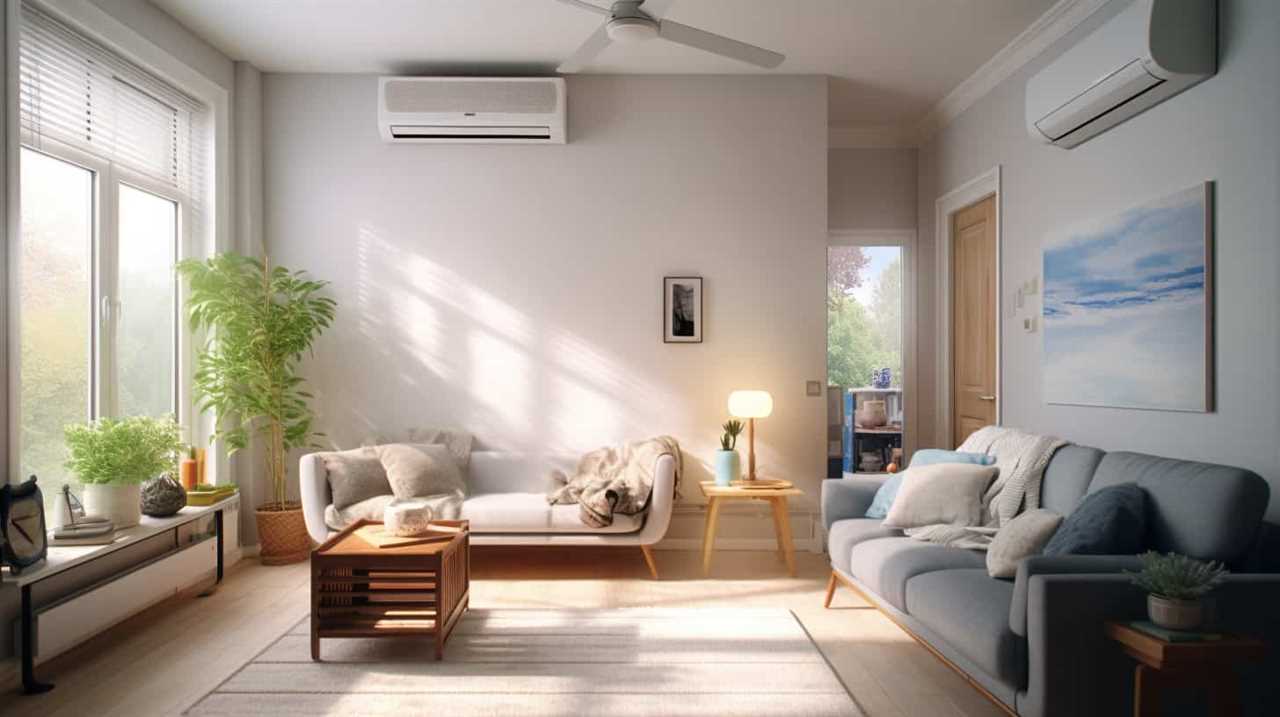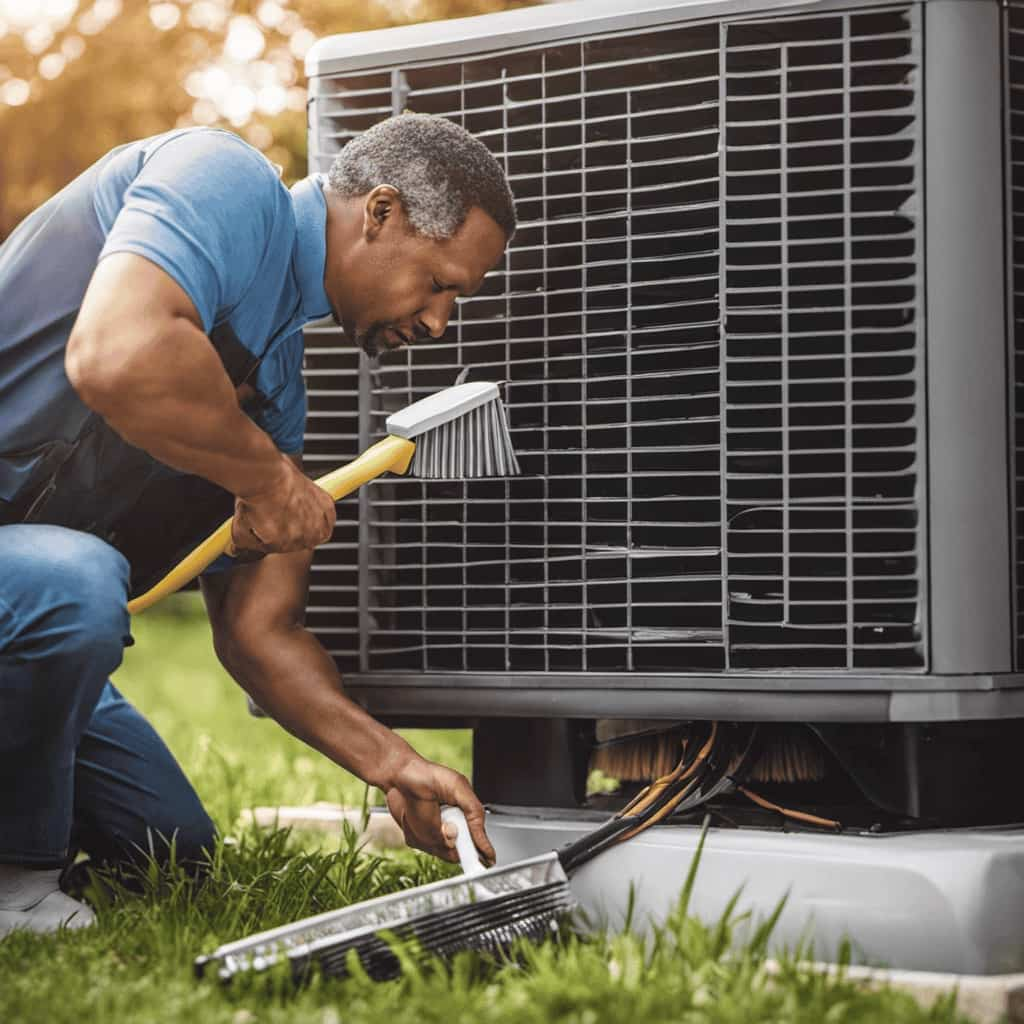
Are you feeling overwhelmed by the many options of heat pumps on the market? Don’t worry, we’re here to help.
Choosing the best heat pump for climate control can be overwhelming, but fear not! In this article, we will be your guiding light, leading you through the technical aspects, evaluating your unique needs, and exploring the features that matter most.
So, grab a cup of coffee and join us as we dive into the world of heat pumps, helping you make an informed decision for your home.
Key Takeaways
- Understand the different types of heat pumps available, such as air-source, ground-source, and ductless mini-split, and consider their suitability for your specific needs.
- Evaluate the energy efficiency of heat pumps by comparing SEER and HSPF ratings, and prioritize higher ratings for greater energy savings.
- Consider climate suitability and heating/cooling needs when choosing a heat pump, taking into account factors like climate zone, load requirements, noise level, and maintenance.
- Research and compare different brands, considering factors like reputation, reliability, customer support, and cost, while also analyzing the potential long-term savings and environmental impact of the heat pump.
Understanding the Different Types of Heat Pumps
We’ll begin by discussing the different types of heat pumps.
When evaluating performance, it’s essential to understand the various options available on the market.
The first type is the air-source heat pump, which extracts heat from the outside air and transfers it inside your home. It’s a cost-effective option and works efficiently in moderate climates.
The second type is the ground-source heat pump, also known as a geothermal heat pump. This system uses the constant temperature of the ground to heat or cool your home. Although it has a higher upfront cost, it provides excellent energy efficiency and long-term savings.
Lastly, there’s the ductless mini-split heat pump, ideal for homes without existing ductwork. It offers flexibility in zoning and allows for independent temperature control in different areas.

When comparing prices, consider not only the initial cost but also the long-term energy savings and maintenance requirements.
Evaluating Your Climate and Heating/Cooling Needs
When it comes to evaluating our climate and heating/cooling needs, there are a few key points to consider.
First, we need to use a climate suitability checklist to determine if a heat pump is the right choice for our specific climate. This checklist takes into account factors such as temperature range, humidity levels, and annual heating and cooling requirements.
Second, we should prioritize efficient temperature control, as this will ensure that our heat pump is able to keep our home comfortable year-round while minimizing energy consumption.

Climate Suitability Checklist
Before selecting a heat pump, it’s important to assess our climate and heating/cooling requirements using a climate suitability checklist. This checklist can help us determine the most appropriate heat pump for our specific needs. Here are five items to consider:
- Climate zone: Determine which climate zone you reside in to understand the temperature ranges and weather conditions you’ll need to combat.
- Heating and cooling load: Calculate the size of your space and the amount of heating and cooling required to maintain a comfortable temperature.
- Energy efficiency: Look for heat pumps with high energy efficiency ratings to maximize climate control benefits while minimizing energy consumption.
- Noise level: Consider the noise tolerance in your home and choose a heat pump with a noise level that suits your preferences.
- Maintenance requirements: Assess the maintenance needs of different heat pump models and choose one that aligns with your schedule and capabilities.
By evaluating these factors, we can select a heat pump that suits our climate and heating/cooling needs efficiently.
Transitioning into the subsequent section about efficient temperature control, let’s explore how heat pumps can offer precise and effective temperature regulation.
Efficient Temperature Control
To ensure efficient temperature control, we frequently evaluate our climate and heating/cooling needs. By understanding our specific requirements, we can choose a heat pump that will provide optimal performance while saving energy.
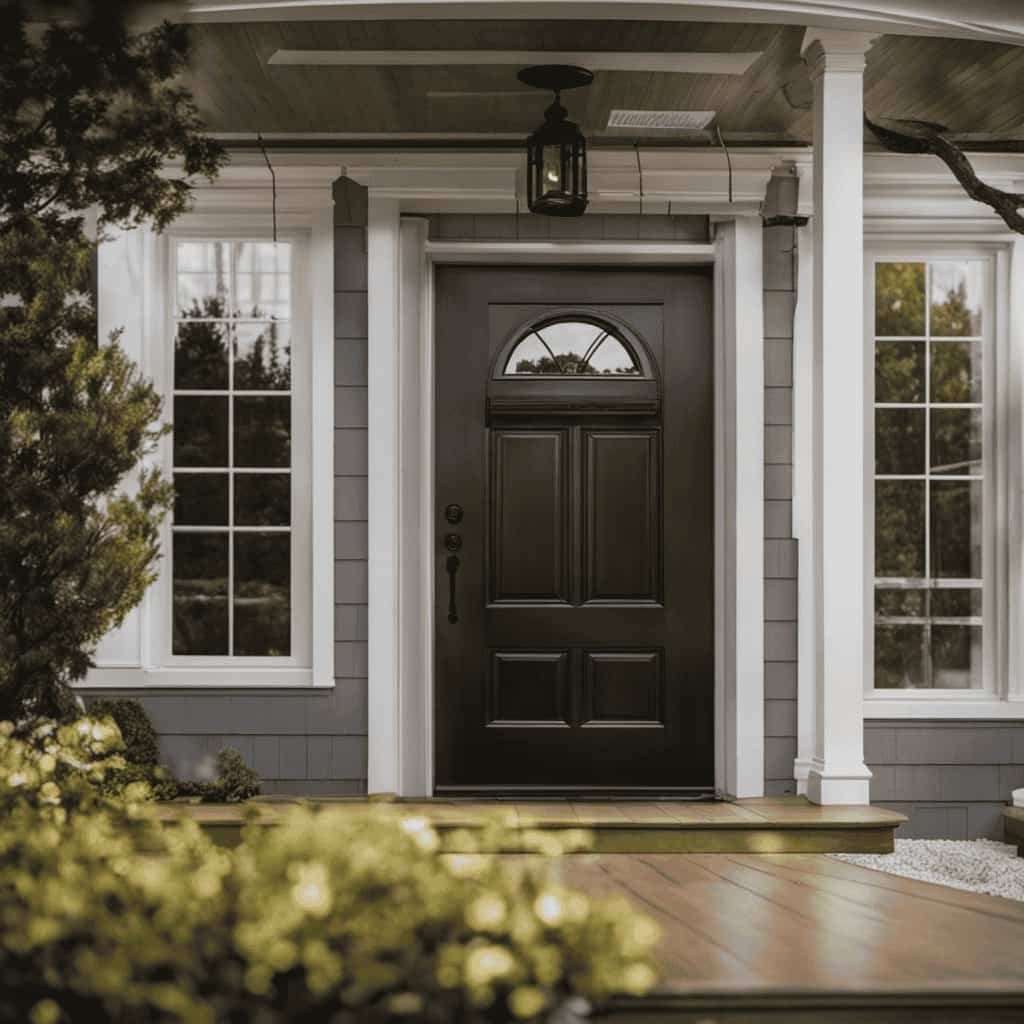
Efficient temperature control is achieved through the use of advanced technology that enables precise adjustments based on the current conditions. Energy saving technology, such as variable speed compressors and smart thermostats, allows the heat pump to adapt to changing temperatures and adjust its output accordingly. This not only ensures that the desired temperature is maintained consistently but also minimizes energy consumption.
By evaluating our climate and heating/cooling needs, we can select a heat pump that’s tailored to our requirements, providing efficient temperature control and reducing energy costs.
Now that we’ve discussed efficient temperature control, let’s move on to the next section about sizing your heat pump for optimal performance.
Sizing Your Heat Pump for Optimal Performance
We need to consider the size of our heat pump for optimal performance in climate control. Proper sizing ensures that the heat pump can efficiently heat or cool the desired space.
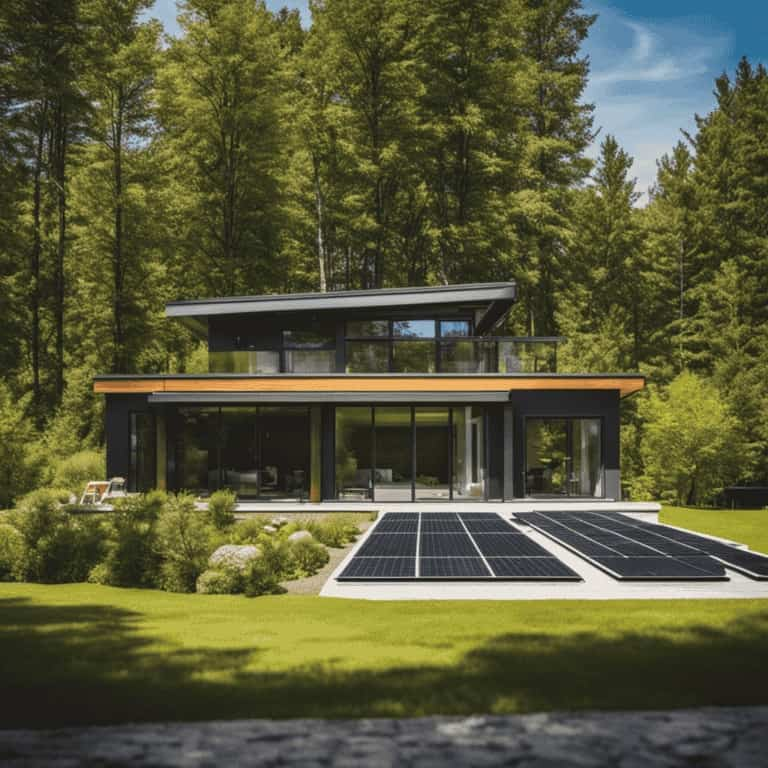
Here are some sizing considerations to keep in mind:
Calculate the heating and cooling loads: Determine the amount of heat that needs to be added or removed from the space. Factors such as insulation, windows, and occupancy levels affect the load calculation.
Consult a professional: Seek the expertise of a heating and cooling professional to accurately determine the appropriate size for your heat pump. They’ll consider factors like climate, square footage, and the layout of the space.
Avoid undersizing: An undersized heat pump will struggle to meet the heating or cooling demands, leading to decreased performance and increased energy consumption.

Avoid oversizing: An oversized heat pump may cycle on and off frequently, resulting in reduced efficiency, increased wear and tear, and inconsistent temperature control.
Consider future needs: Take into account any potential changes in the space, such as additions or renovations, to ensure your heat pump can handle future requirements.
Comparing Energy Efficiency Ratings
When comparing energy efficiency ratings, we should consider the Seasonal Energy Efficiency Ratio (SEER) and the Heating Seasonal Performance Factor (HSPF) of different heat pump models. SEER measures the cooling efficiency of a heat pump, while HSPF gauges its heating efficiency. Higher SEER and HSPF values indicate greater energy efficiency.
Evaluating cost effectiveness involves looking at the initial purchase price, as well as the long-term energy savings that a more efficient heat pump can provide. It’s important to compare the SEER and HSPF ratings of different models to determine their energy efficiency and potential savings.
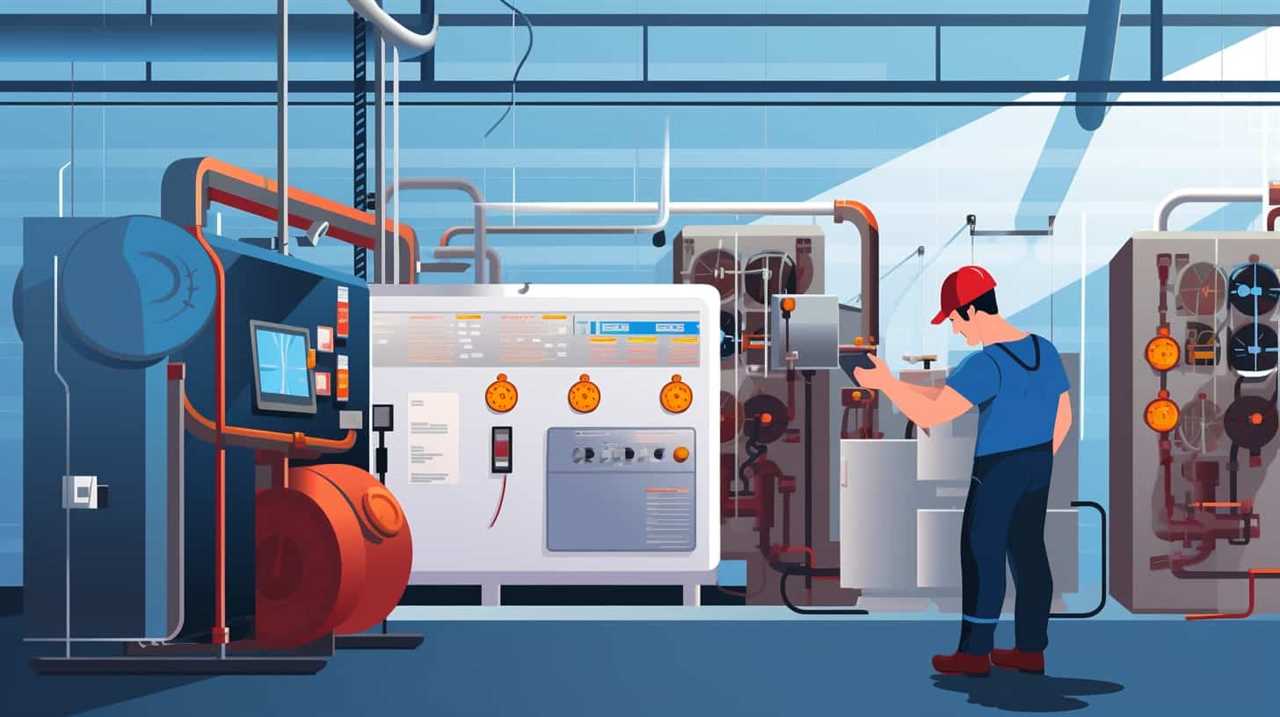
Additionally, comparing environmental impact is crucial. Energy-efficient heat pumps consume less energy, leading to reduced greenhouse gas emissions. By choosing a heat pump with higher SEER and HSPF ratings, we can contribute to a more sustainable future while saving on energy costs.
Exploring Additional Features and Technology
Our research found that the heat pump’s additional features and technology greatly enhance its performance. When exploring smart technology options, consider the following:
Wi-Fi connectivity: Some heat pumps can be connected to your home’s Wi-Fi network, allowing you to control and monitor your climate settings remotely through a mobile app.
Smart thermostats: Many heat pumps now come with built-in smart thermostats, which can learn your preferences and adjust the temperature accordingly, optimizing energy efficiency.

Variable-speed motors: Heat pumps equipped with variable-speed motors can adjust the speed of the compressor and fan, providing more precise temperature control and reducing energy consumption.
Dual fuel compatibility: Some heat pumps can be used in conjunction with a gas or oil furnace, allowing for seamless switching between different fuel sources based on efficiency and outdoor temperatures.
Environmentally friendly refrigerants: Consider heat pumps that use eco-friendly refrigerants, such as R-410A, which have lower greenhouse gas emissions and contribute to a more sustainable environment.
With these additional features and technology, you can enjoy greater control, energy efficiency, and eco-friendliness in your climate control system.
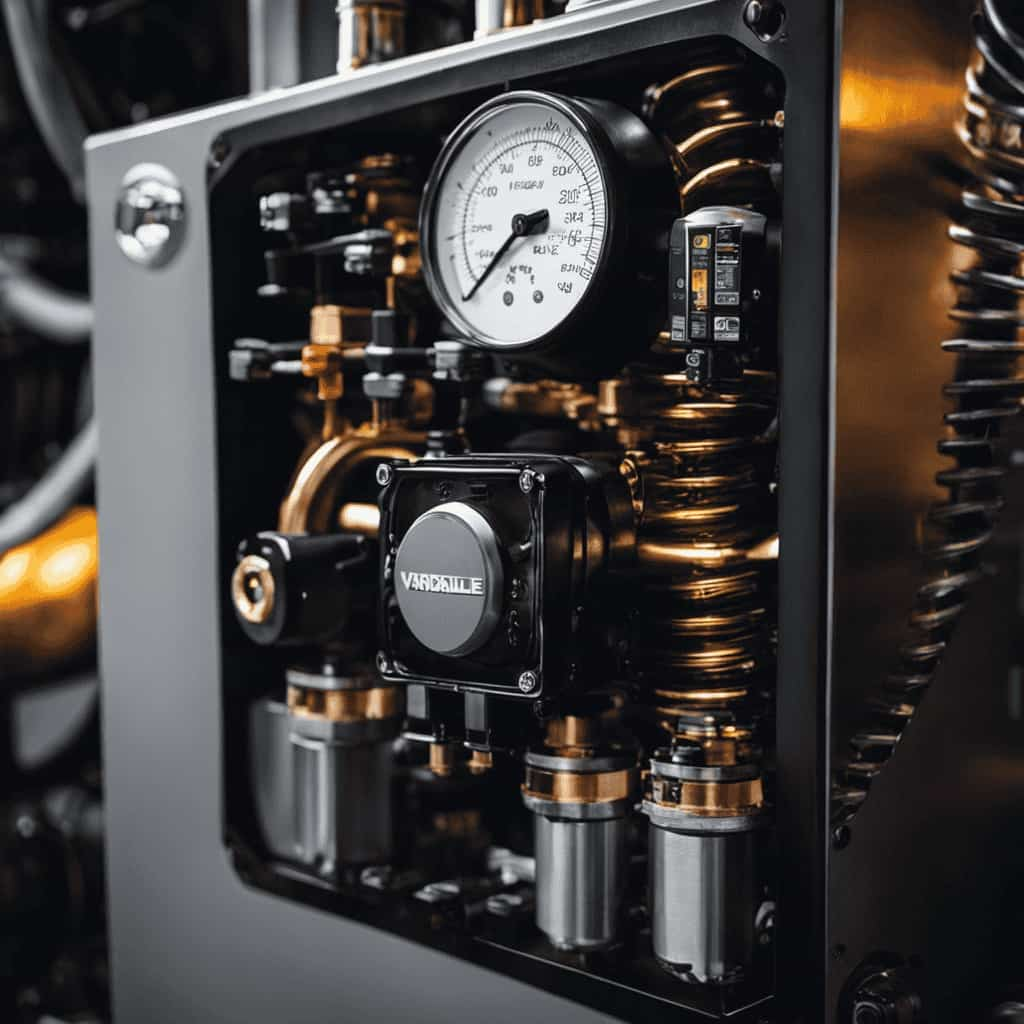
Now, let’s move on to the next section and consider the importance of noise levels and location when choosing a heat pump.
Considering Noise Levels and Location
During the selection process, it is important to take into account the noise levels and location of the heat pump. Noise reduction is a crucial factor to consider, as a quiet heat pump can prevent disturbances and ensure a peaceful environment. When evaluating noise levels, it is recommended to review the manufacturer’s specifications and look for units with lower decibel ratings. Additionally, location planning is essential to minimize noise impact. Placing the heat pump away from bedrooms or living areas can help reduce noise disruption. Consideration should also be given to the unit’s vibration levels and the potential for sound insulation. By carefully assessing noise levels and strategically planning the location of the heat pump, you can ensure optimal comfort without compromising tranquility.
| Noise Reduction | Location Planning |
|---|---|
| Review manufacturer’s specifications for noise levels | Place heat pump away from bedrooms or living areas |
| Look for units with lower decibel ratings | Consider vibration levels and potential for sound insulation |
Assessing Installation and Maintenance Requirements
To ensure optimal performance and longevity, we must carefully assess the installation and maintenance requirements of the heat pump. Here are some key factors to consider:
Assessing energy consumption: It’s crucial to evaluate the energy efficiency of the heat pump before installation. Look for models that have high Seasonal Energy Efficiency Ratio (SEER) and Heating Seasonal Performance Factor (HSPF) ratings, as these indicate better energy efficiency.
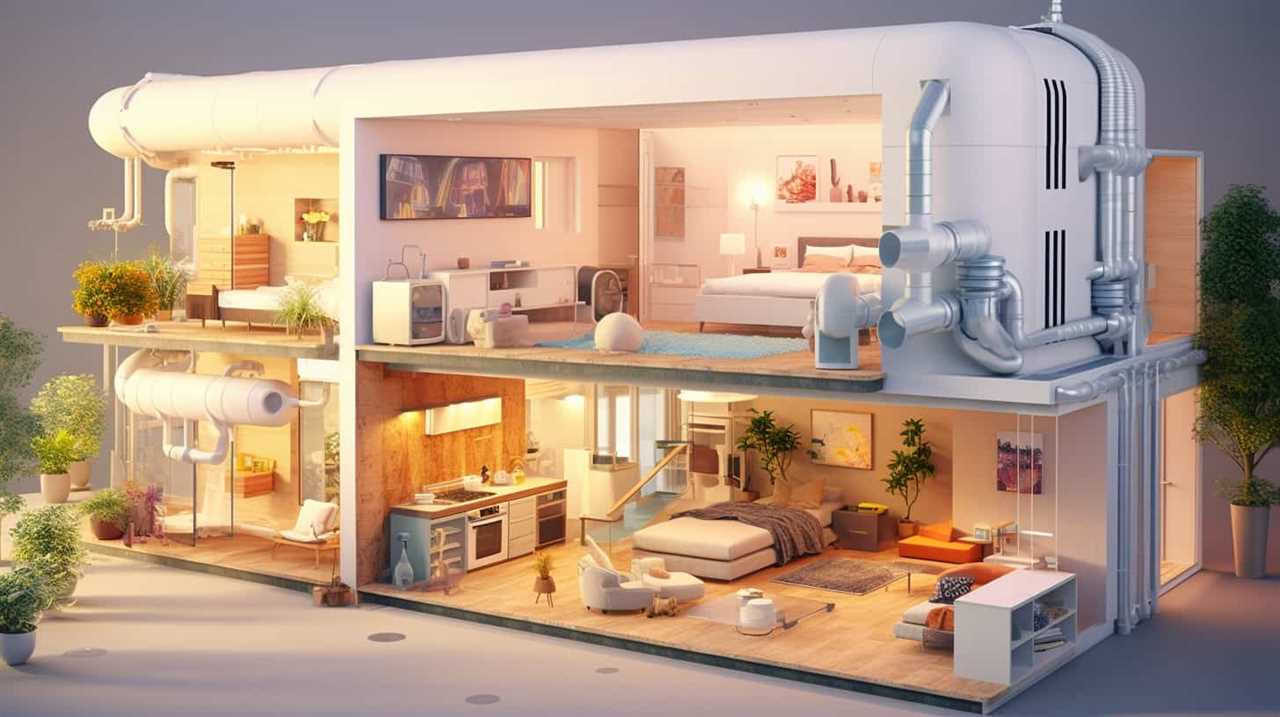
Understanding warranty policies: Familiarize yourself with the warranty policies offered by the manufacturer. Pay attention to the coverage period and what’s included in the warranty. This will help you understand the level of support and protection you can expect.
Proper installation: Hiring a professional HVAC technician for the installation ensures that the heat pump is set up correctly, preventing any potential issues and maximizing its performance.
Regular maintenance: Regular maintenance is essential for the heat pump’s longevity. This includes cleaning or replacing filters, inspecting and cleaning coils, lubricating moving parts, and checking refrigerant levels.
Timely repairs: Addressing any issues promptly and seeking professional repair services when needed can prevent further damage and ensure the heat pump operates efficiently for years to come.
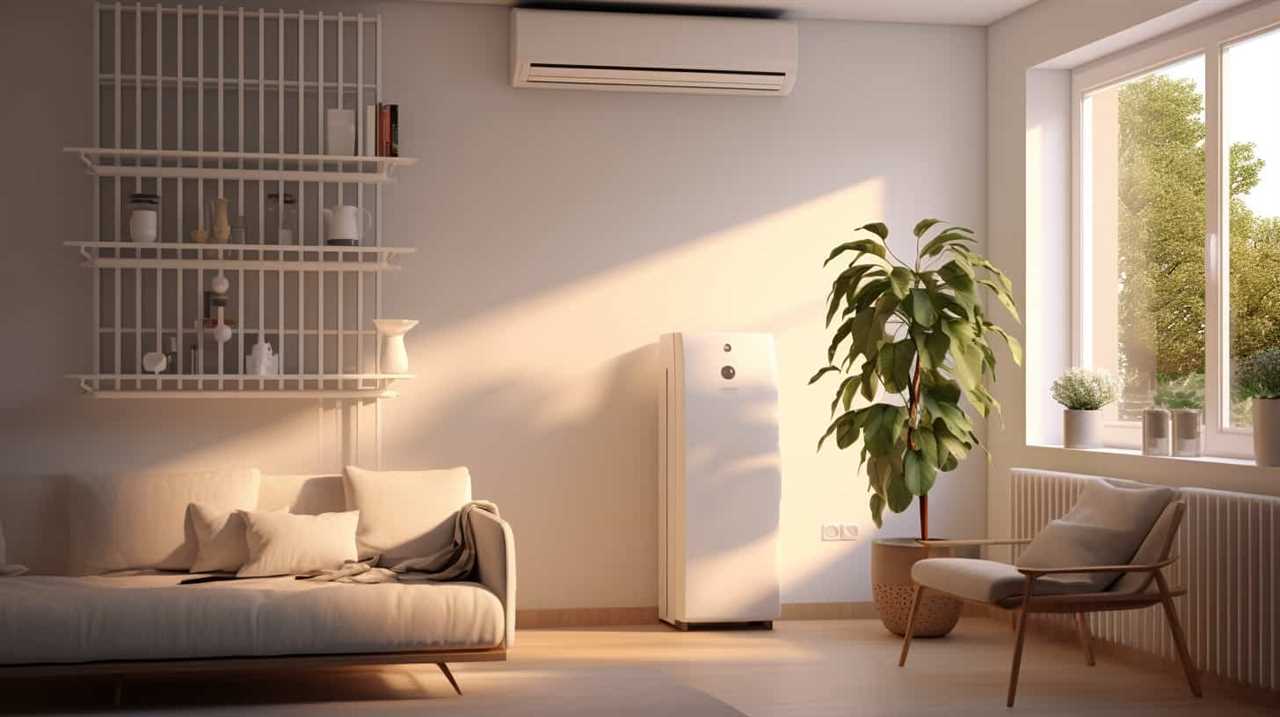
Understanding the installation and maintenance requirements of a heat pump is crucial for its optimal performance and longevity. Once you have assessed these factors, you can move on to the next step of researching brands and manufacturers.
Researching Brands and Manufacturers
Once we have assessed the installation and maintenance requirements, it is important to research brands and manufacturers to ensure we choose the best heat pump for climate control. When researching brands, it is crucial to consider factors such as reputation, reliability, and customer support. One effective way to gather information is by reading customer reviews online. These reviews provide valuable insights into the performance and satisfaction of previous buyers. Additionally, researching pricing can help us make an informed decision while staying within our budget. By comparing prices from different manufacturers, we can find the best value for our investment. To help you in your research, here is a table comparing three popular heat pump brands:
| Brand | Reputation | Customer Reviews |
|---|---|---|
| Brand A | Excellent | Positive |
| Brand B | Good | Mixed |
| Brand C | Average | Negative |
Determining Your Budget and Return on Investment
When considering the budget for a heat pump, it’s crucial to weigh the cost against the long-term savings.
Conducting a financial feasibility analysis can help determine the return on investment and make an informed decision.

Cost Vs. Long-Term Savings
We will analyze the cost and long-term savings of different heat pumps to determine our budget and return on investment. When considering the cost effectiveness of a heat pump, it’s important to look beyond the initial purchase price. Here are some key factors to consider:
Energy Efficiency: Look for heat pumps that have a high Seasonal Energy Efficiency Ratio (SEER) and Heating Seasonal Performance Factor (HSPF) ratings. Higher ratings indicate greater energy efficiency, which can lead to long-term savings on utility bills.
Maintenance and Repairs: Consider the cost of regular maintenance and potential repairs. Some heat pumps may require more frequent servicing or have higher repair costs, which can impact the overall cost effectiveness.
Lifespan: Longer lifespan heat pumps may have a higher upfront cost but can provide greater long-term savings by reducing the need for premature replacement.
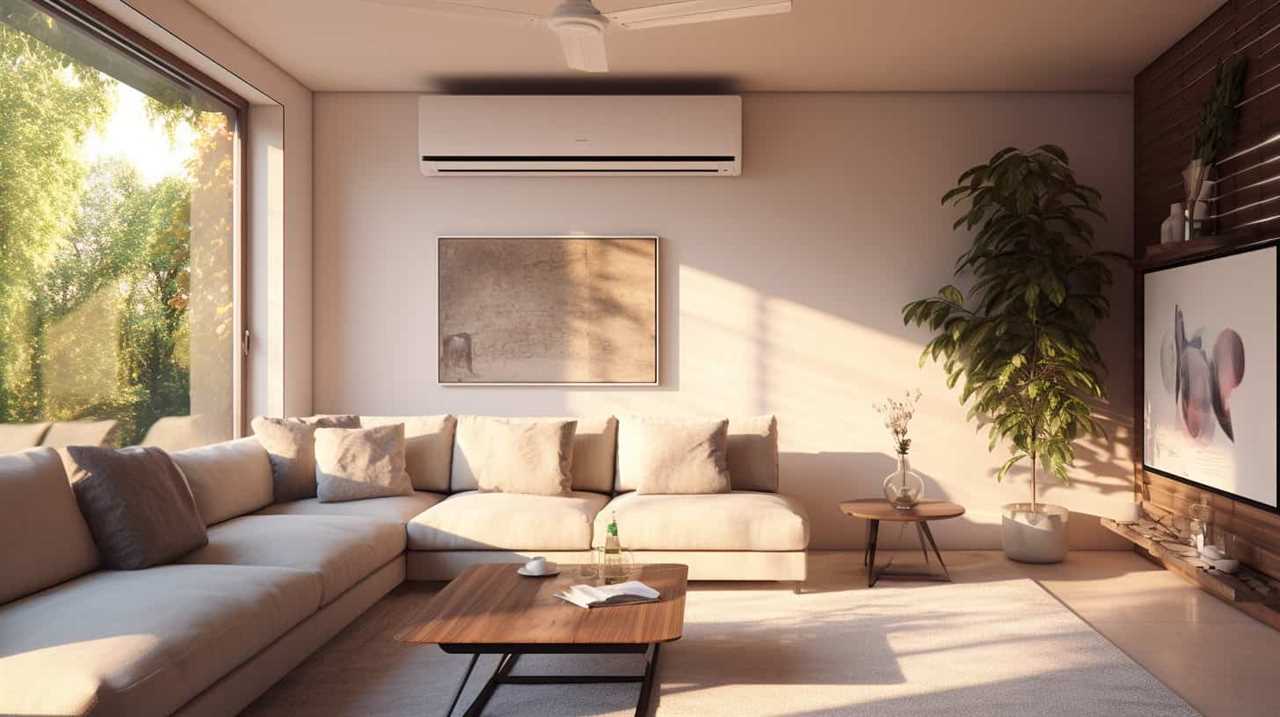
Environmental Impact: Evaluate the environmental impact of the heat pump. Opting for energy-efficient models that use eco-friendly refrigerants can contribute to a greener and more sustainable future.
Incentives and Rebates: Research any available incentives or rebates offered by utility companies or government programs. These can help offset the initial cost and improve the long-term return on investment.
Financial Feasibility Analysis
To determine our budget and return on investment, we need to conduct a financial feasibility analysis for choosing the best heat pump for climate control. This analysis involves a detailed financial assessment of the costs and benefits associated with different heat pump options.
The first step in the financial analysis is to determine the initial cost of purchasing and installing the heat pump. This includes the cost of the unit itself, as well as any additional expenses such as installation fees and necessary upgrades to the existing HVAC system.
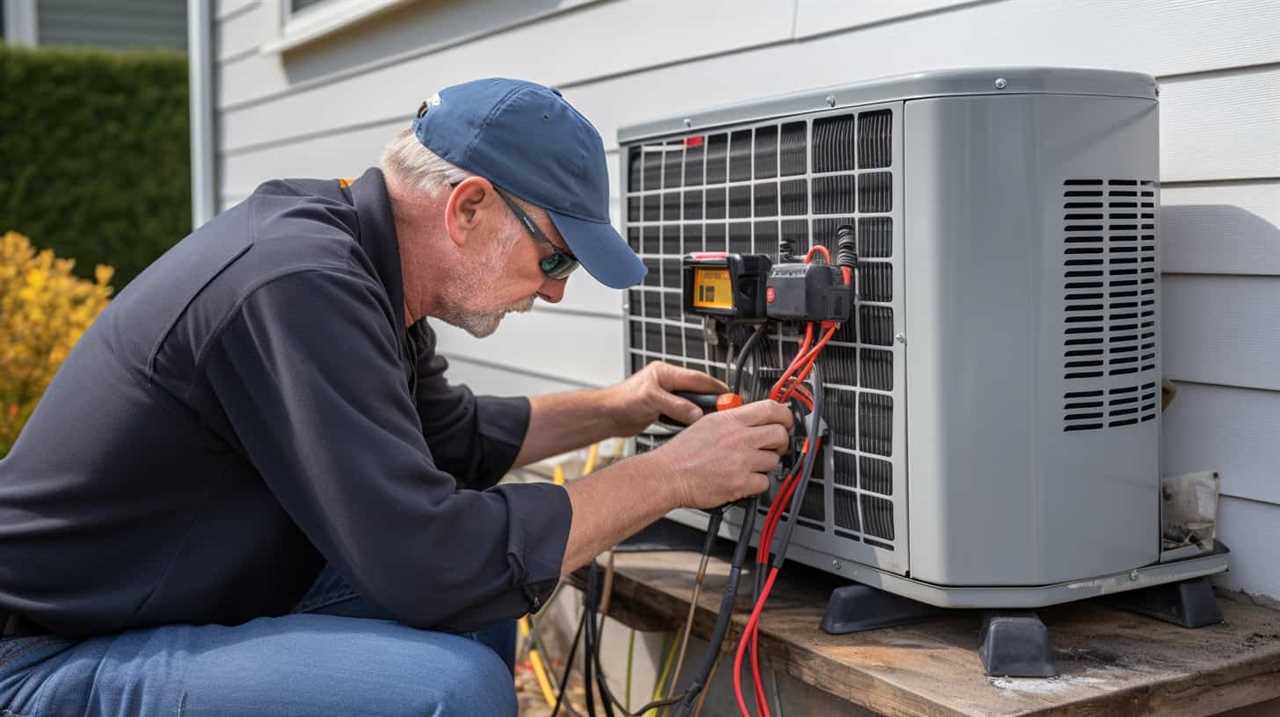
Next, we need to consider the long-term savings that can be achieved with each heat pump option. This involves calculating the potential energy savings over the lifespan of the unit, taking into account factors such as the efficiency of the heat pump and the local energy prices.
Once we’ve gathered all the necessary data, we can perform a cost-benefit analysis to determine the financial viability of each heat pump option. This analysis compares the initial costs with the long-term savings to assess the return on investment.
Frequently Asked Questions
How Long Does a Heat Pump Typically Last?
Heat pump lifespans can vary based on factors like maintenance and usage. Several elements affect longevity, such as proper installation and regular servicing. Understanding these factors can help maximize a heat pump’s lifespan.
Can a Heat Pump Be Used for Both Heating and Cooling?
Yes, a heat pump can be used for both heating and cooling. Despite concerns about efficiency, the benefits of using a heat pump for climate control far outweigh any potential drawbacks.

Are Heat Pumps Environmentally Friendly?
Heat pumps are environmentally friendly due to their high heat pump efficiency and low environmental impact. They can efficiently transfer heat from one location to another, reducing energy consumption and greenhouse gas emissions.
What Is the Average Cost of Installing a Heat Pump?
The average cost of installing a heat pump varies depending on the size and complexity of the system. The installation process involves assessing the site, selecting the appropriate unit, and ensuring proper electrical connections.
Can a Heat Pump Be Used in Extremely Cold Climates?
In extremely cold climates, heat pump efficiency may be reduced. However, some of the best heat pump brands offer models specifically designed for these conditions. These pumps utilize advanced technology to ensure optimal performance even in freezing temperatures.
What Factors Should I Consider When Choosing a Heat Pump for Climate Control?
When selecting the best heat pump for climate control, there are a few vital factors to consider. Firstly, the size of the space you wish to cool or heat, as this will determine the heat pump’s capacity. Secondly, energy efficiency ratings, such as the SEER and HSPF, should be examined to ensure optimal performance. Additionally, it’s crucial to assess the noise level and durability of the heat pump. Lastly, considering your specific climate and weather patterns can help determine if additional features like dehumidification or dual fuel capability are necessary for efficient climate control.
Conclusion
After carefully evaluating the different types of heat pumps, considering our climate and heating/cooling needs, and analyzing energy efficiency ratings, additional features, noise levels, and installation requirements, we’re confident in our ability to choose the best heat pump for climate control.
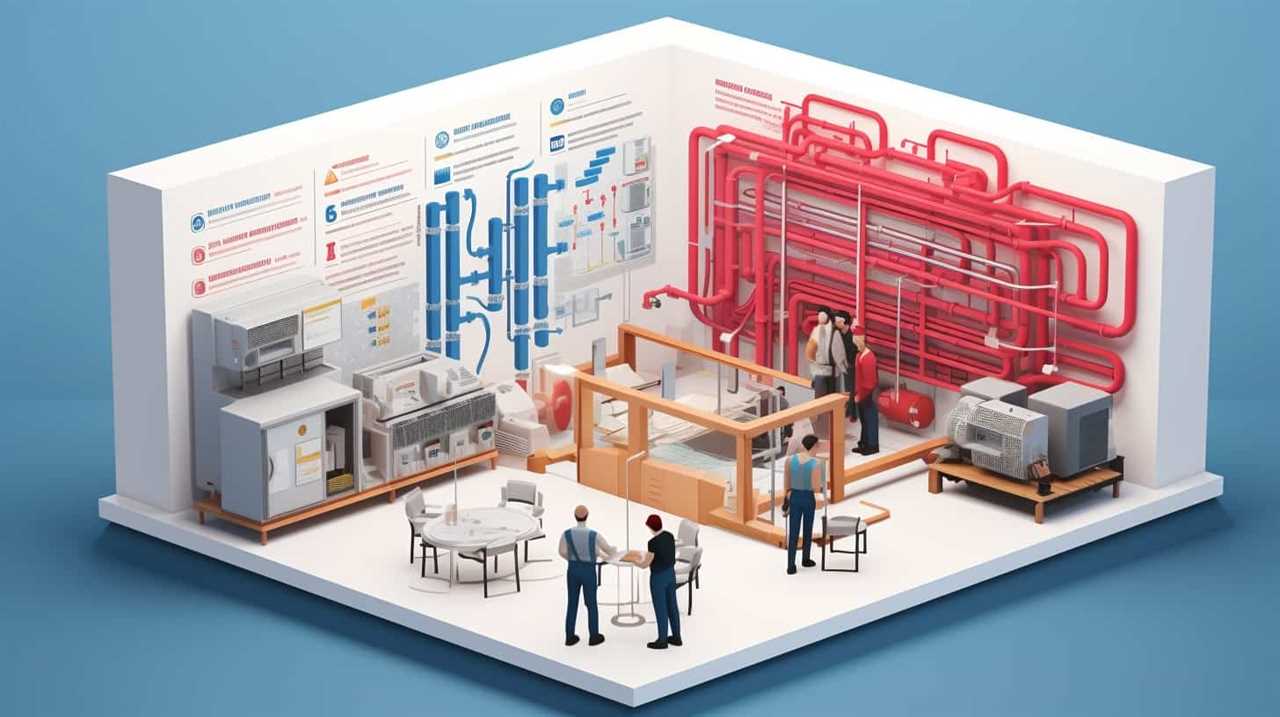
While some may argue that the cost and maintenance requirements of heat pumps can be high, the long-term energy savings and comfort provided make it a worthwhile investment for a more sustainable future.





